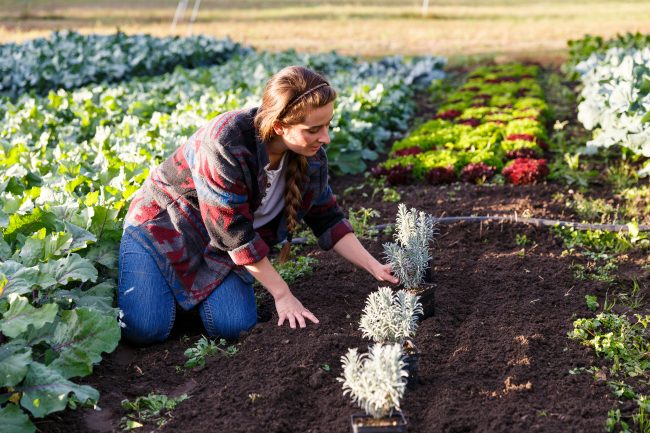
In May, 10 small American farms and agricultural nonprofits received a total of $42,913 in funding for sustainable farm projects. As the 2017 sustainable farm projects take root, we are beginning to see the many benefits.
The 2017 projects ranged from installing rainwater catchment systems to planting native perennial hedgerows across the following farms: Chicago Patchwork Farms, in Chicago, IL; Foxtrot Organic Farm in St. Charles, IL; Byars Family Farm in Ardmore, OK; Songbird Farm in Unity, MN; Bertrand Farm in Niles, MI; Soil Born Farms in Rancho Cordova, CA; Marsteller Farm in Freeland, MD; The Growing Club – Sarvodaya Farms in Pomona, CA; Blackhawk Courts Farm and Garden in Rockford, IL; and Urban Tree Connection – Neighborhood Foods Farm in Philadelphia, PA.
Below are highlights from the 2017 Grantees final reports:
Urban Tree Connection
Urban Tree Connection – Neighborhood Foods Farm, a non-profit organization in the Haddington neighborhood of West Philadelphia, PA. Neighborhood Foods Farm is located on a formerly abandoned 3⁄4 acre lot. Since 2010, they have grown fruits, vegetables, and herbs without harmful chemical inputs at little to no cost for community members. Their, $2,500 grant allowed them to start a seed-saving project that incorporates culturally-important seed varieties as well as build an education program for the local community.
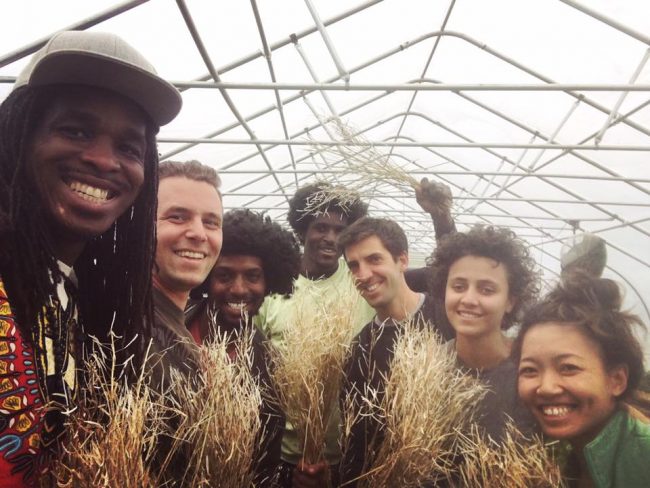
“One of the most successful aspects of our seed-keeping project has been our community impact through our education programming. We mentored our 11 youth apprentices to care for each of the crops in the seed-keeping project, and they were tasked with learning about the cultural stories connected to each crop. Our young people led several seed-keeping demos, facilitating workshops with community gardeners on how to keep seeds. In total, we held three workshops and a culminating community event(Harvest Party) where over 50 community members learned about seed-keeping related to the five noted crops – and many participants went home with seeds to plant on their own!” ~ Noelle Warford, Director
Chicago Patchwork Farms
Chicago Patchwork Farms is a no-till, organic, and bio-intensive ½ acre urban farm in Chicago, IL. They produce mainly vegetables, eggs, medicinal herbs, preserved foods, honey, cut flowers, and a compost drop-off program. Their $5,000 grant funded the purchase of an ice freezer, solar panels, a lean-to structure as well as, extra coolers and compost to support their new “Neighborhood Greens Program.”
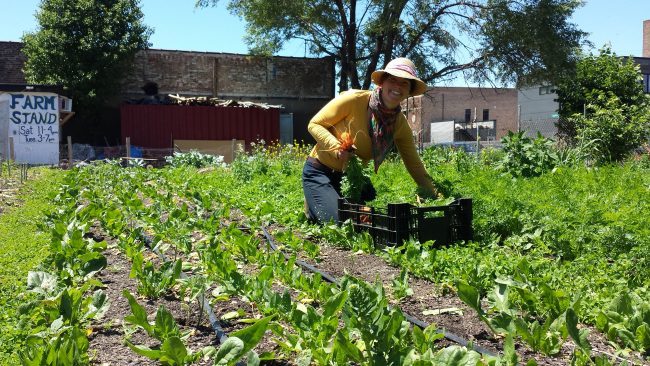 “Yields are up because of our new 750 sq ft growing space. Since we started freezing our own ice, we have reduced our weekly expenditures by $60. By reusing ice packs that are cooled using solar electricity instead of buying bags of ice, we have been able to both cut down on our energy usage as well as eliminate the waste of plastic bags. We also save staff time by having ice ready on the farm. Having a permanent lean-to structure has also allowed us to eliminate the staff time we used to setup and breakdown shade structures on harvest days Customers to our farmstand have doubled this year and we have enough ice to keep our expanded production and market days fresh and cool!”
“Yields are up because of our new 750 sq ft growing space. Since we started freezing our own ice, we have reduced our weekly expenditures by $60. By reusing ice packs that are cooled using solar electricity instead of buying bags of ice, we have been able to both cut down on our energy usage as well as eliminate the waste of plastic bags. We also save staff time by having ice ready on the farm. Having a permanent lean-to structure has also allowed us to eliminate the staff time we used to setup and breakdown shade structures on harvest days Customers to our farmstand have doubled this year and we have enough ice to keep our expanded production and market days fresh and cool!”
Foxtrot Organic Farm
Foxtrot Organic Farm, a 6 acre certified organic farm in St. Charles, IL grows over 140 varieties of diversified fruits, vegetables, herbs, and cut flowers. Their $3,359 grant allowed them to establish a perennial hedgerow for beneficial insects and pollinators, increase soil health by applying organic cover crops and compost and minimize tillage through the purchase of a “tilther” tool, which preserves the topsoil layer and combats weed seeds in the soil, reducing time spent weeding.
“Through the purchase of our Johnny’s tilther tool, we have begun to minimize tillage & preserve our soil structure by reducing tillage to the top two inches of the soil whenever possible. We established our first perennial pollinator hedgerow including Jerusalem Artichoke & Lavender plants. Flowering early in the spring and late in the fall, these plants will provide essential pollen and nectar to beneficial insects at a time when other food is scarce.
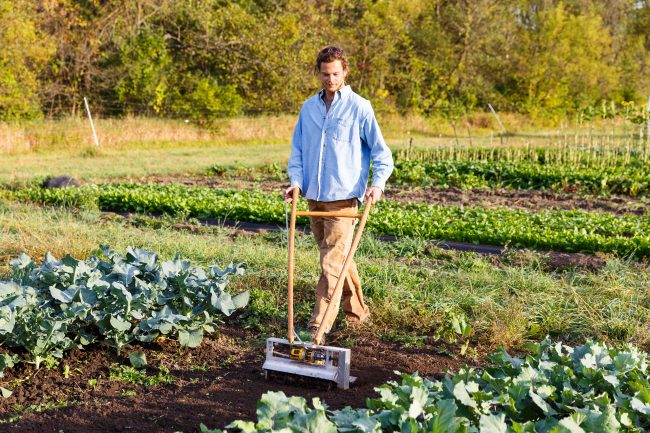 These perennial crops, along with the grant funded cover crops, build soil year after year. The only challenge we ran into with this portion of the project was availability of organic Jerusalem Artichoke stock- our original supplier was out of stock at the time of purchase, so we substituted a different organic supplier. Last but certainly not least, we were able to purchase about 85,000lbs of organic compost used to expand our production acreage by more than half. The benefits of this fertility will be realized in the upcoming 2018 season, but we have already purchased and spread compost on the new acreage. Compost brings rich biodiversity to the life of the soil, creating more resilient plants, stabilizing the soil & preventing erosion.” ~ Jeff Hughes & Ellen Kamps, Farmers
These perennial crops, along with the grant funded cover crops, build soil year after year. The only challenge we ran into with this portion of the project was availability of organic Jerusalem Artichoke stock- our original supplier was out of stock at the time of purchase, so we substituted a different organic supplier. Last but certainly not least, we were able to purchase about 85,000lbs of organic compost used to expand our production acreage by more than half. The benefits of this fertility will be realized in the upcoming 2018 season, but we have already purchased and spread compost on the new acreage. Compost brings rich biodiversity to the life of the soil, creating more resilient plants, stabilizing the soil & preventing erosion.” ~ Jeff Hughes & Ellen Kamps, Farmers
Byars Family Farm
Byars Family Farms, a 5-acre farm in Southern Oklahoma within the Chickasaw Nation, grows 12 different varieties of vegetables that are sold at farmers markets, their farm stand, and a wholesale account. Their $5,000 grant allowed them to build a hoop house and fund a mulch layer. The hoop house will extend the growing season and provide a space to grow transplants for SNAP participants. The mulch layer will increase yields of produce by concentrating heat, water, and nourishment.
“In just a few months of season extension and added growing, we
have been able to add our first long term wholesale account. This Spring of 2018 will be the first time we have a chance to sell seedling transplants to our community and to the Chickasaw Nation. However, the outreach of more season extension has reaped a benefit of being able to serve more people with voucher system at the farm.” ~ Tammy Byars, Farmer
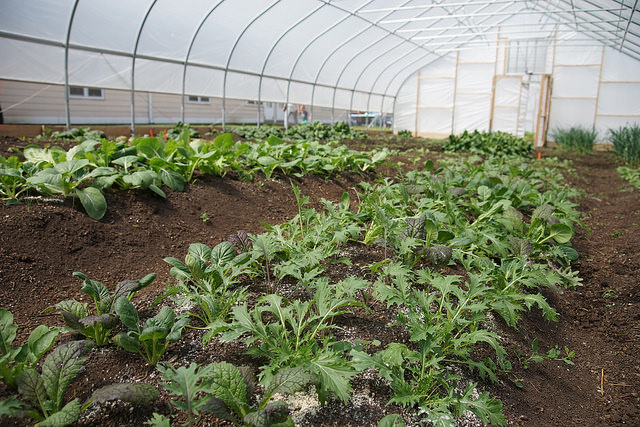
Songbird Farm
Songbird Farm, a 13-acre farm in Unity, ME, grows certified organic mixed vegetables, small grains and stone ground flour that is primarily sold wholesale to a distributor, direct to natural food stores, and through a CSA. Their $2966 grant allowed them to build a rainwater catchment system on a 40-foot barn with a metal roof.
“We were pleased to see that it takes only a small amount of rainfall to refill the barrels, which indicates that we’ll reap significant benefit from the water collection system on drought years. Also, an unexpected benefit was access to water during a power outage. Maine was hit by a hurricane this fall that knocked out power across the state for about a week. We had vegetable orders scheduled for that week, and while our well pump sat idle, we were able to siphon water from the tanks and use it to wash carrots and beets.
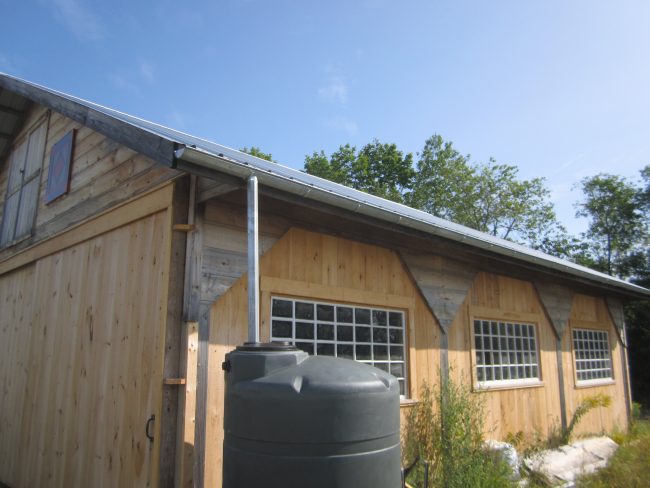
Due to the increase of storms and weather severity in a changing climate we can expect to lose power more frequently in future seasons. These water tanks will provide a great resource and this system will be set up and running indefinitely. The long term benefits are as strong as the short term. This project enables us to take advantage of the rainwater that falls onto the roof of our barn for the lifespan of the farm.” ~ Johanna Davis, Farmer
Bertrand Farm
Bertrand Farm, a nonprofit educational farm in Niles, MI, whose mission is to connect people to local food production and promote sustainable agriculture, health, and Earth stewardship, produces a variety of fruits and vegetable on 8 acres which are primarily sold through a CSA. Their $4,991 grant allowed them to establish a 500ft perennial food project.
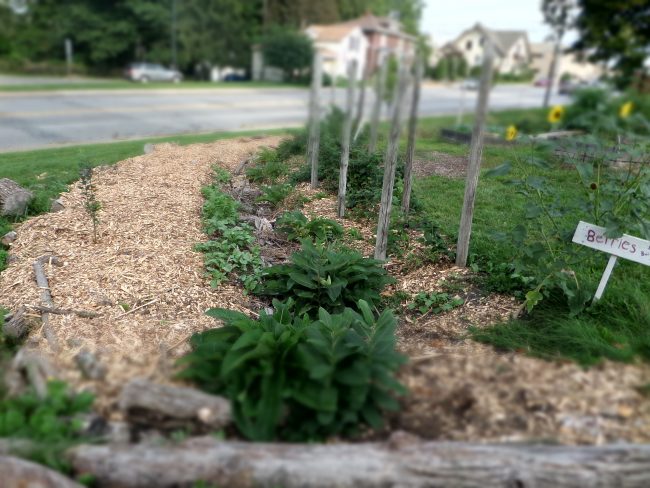
“This site will provide increased carbon sequestering over time and create higher yields of produce with decreased inputs demonstrating a unique model of restoration agriculture to be modeled for all visiting groups and students of farming. Demonstration and research site will continue indefinitely.“ ~ Therese Niemier, Director
Sarvodaya Farm
The Growing Club – Sarvodaya Farm, a nonprofit educational farming program in Pomona, CA, produces organically-grown fruits, vegetables, herbs, and pasture raised eggs on an acre that is made up of 3 suburban farm sites. Their $4,996 grant helped them establish four California Native perennial hedgerows.
“We have already noticed an increase in insect and bird diversity on our farm
since the planting of our perennial hedgerows. Some of the plants even
managed to flower during the extremely hot summer, and the flowers were
obviously attractive to local insect populations. At this point, the plants have
not established themselves enough to have had a significant impact on pest
populations, as they are still small and have had trouble growing through the
summer’s heat.
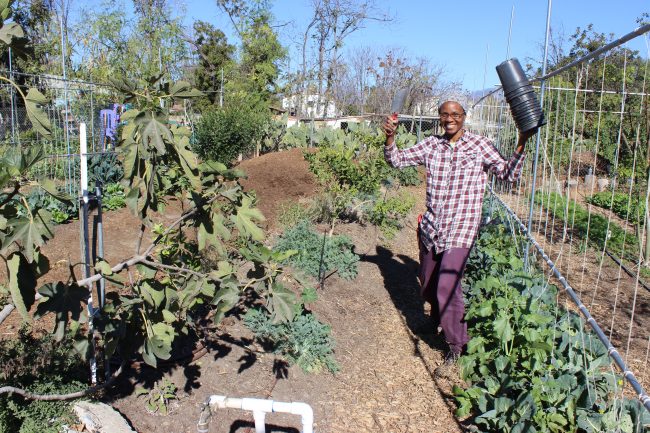 We expect that they will grow significantly next spring, after
We expect that they will grow significantly next spring, after
they have had a rainy and cool season to establish themselves. Still, it has been
exciting to see the new creatures that have arrived with these plants, including
many Monarch butterflies and Swallowtail butterflies.” ~ Rishi Kumar, Farm Manager
Blackhawk Courts Farm and Garden
Blackhawk Courts Farm and Garden is a ½-acre community-led organic farm and community garden on the grounds of Rockford Housing Authority (RHA) Blackhawk Courts public housing property in Rockford, IL. The farm program engages youth and adult apprentices in educational programming and on-site markets. At the community garden, Blackhawk Court residents are able to pick produce at any time for free. Their $4,100 grant allowed them to carry out soil testing while creating compost, cover crops, and planting perennials to help improve soil health and attract and support pollinators.
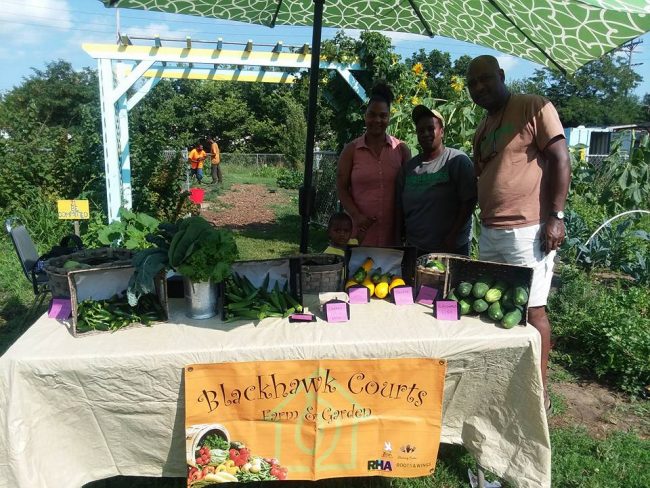 “We purchased cover crop seeds, perennial raspberry bushes, perennial herbs, asparagus, and strawberries. We planted a portion of the cover crops in some sections of the farm this spring, but planted a majority of the crops and plants this fall. We also purchased and applied a layer of compost to the farm and Hoop houses in the spring and fall. We submitted “3” soil test for different areas on the farm and in the hoophouse and we are awaiting the results. Overall, we managed approximately 17,300 square feet of active growing space, harvested approximately 2,500 pounds of produce (approximately 6,900 servings), and generated $10,510 in sales from the Roots & Wings CSA, market days and other business sales.” ~ Britney Stubbs, Grant Manager
“We purchased cover crop seeds, perennial raspberry bushes, perennial herbs, asparagus, and strawberries. We planted a portion of the cover crops in some sections of the farm this spring, but planted a majority of the crops and plants this fall. We also purchased and applied a layer of compost to the farm and Hoop houses in the spring and fall. We submitted “3” soil test for different areas on the farm and in the hoophouse and we are awaiting the results. Overall, we managed approximately 17,300 square feet of active growing space, harvested approximately 2,500 pounds of produce (approximately 6,900 servings), and generated $10,510 in sales from the Roots & Wings CSA, market days and other business sales.” ~ Britney Stubbs, Grant Manager
Soil Born Farms
Soil Born Farms, a nonprofit farm in Rancho Cordova, CA, grows 45 different vegetable crops and 9 different varieties of fruit on 55 acres. Their $5,000 grant helped them move toward a no-till system focused on increasing organic matter and improving soil quality. They purchased a bed mower and 4 occultation tarps to aid decomposition without tillage.
“At the outset of the tarps implementation we hypothesized a decrease in weed population. We were proven correct in compounding fashion. Weed pressure was diminished at rates far greater than expected and plants growing areas treated with tarps were healthier, higher yielding, and exhibited less insect damage.
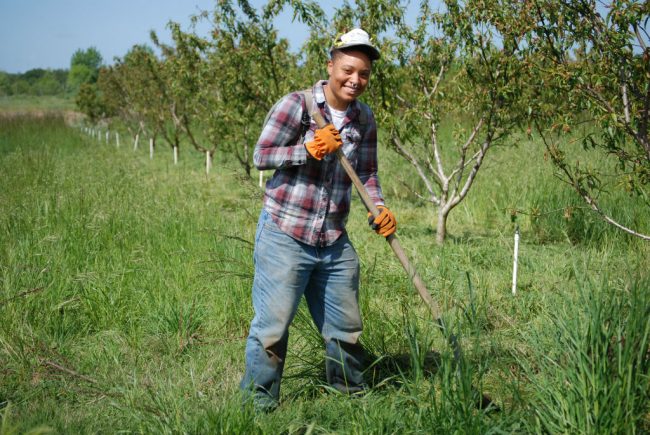
The ability to showcase an accessible, low cost, highly effective method of garden and field preparation. Topsoil loss happens most often during times of tillage. Specifically during field preparation. Through implementing and showcasing this technique we have the potential to significantly reduce soil erosion rates at our farm and in the back yard gardens in our community.” ~ Melanie Choy, Programs Manager
Now that our 2017 grants have wrapped up for the season, we’re in the process of receiving and evaluating 2018’s grant proposals. Interested in helping out or donating to our small farm sustainability projects? Your time and money goes towards supporting a healthy food system and small farm economy.
*Note: Marsteller Farm in Freeland, MD was unable to complete their sustainability project due to unforeseen challenges regarding access to their land.



